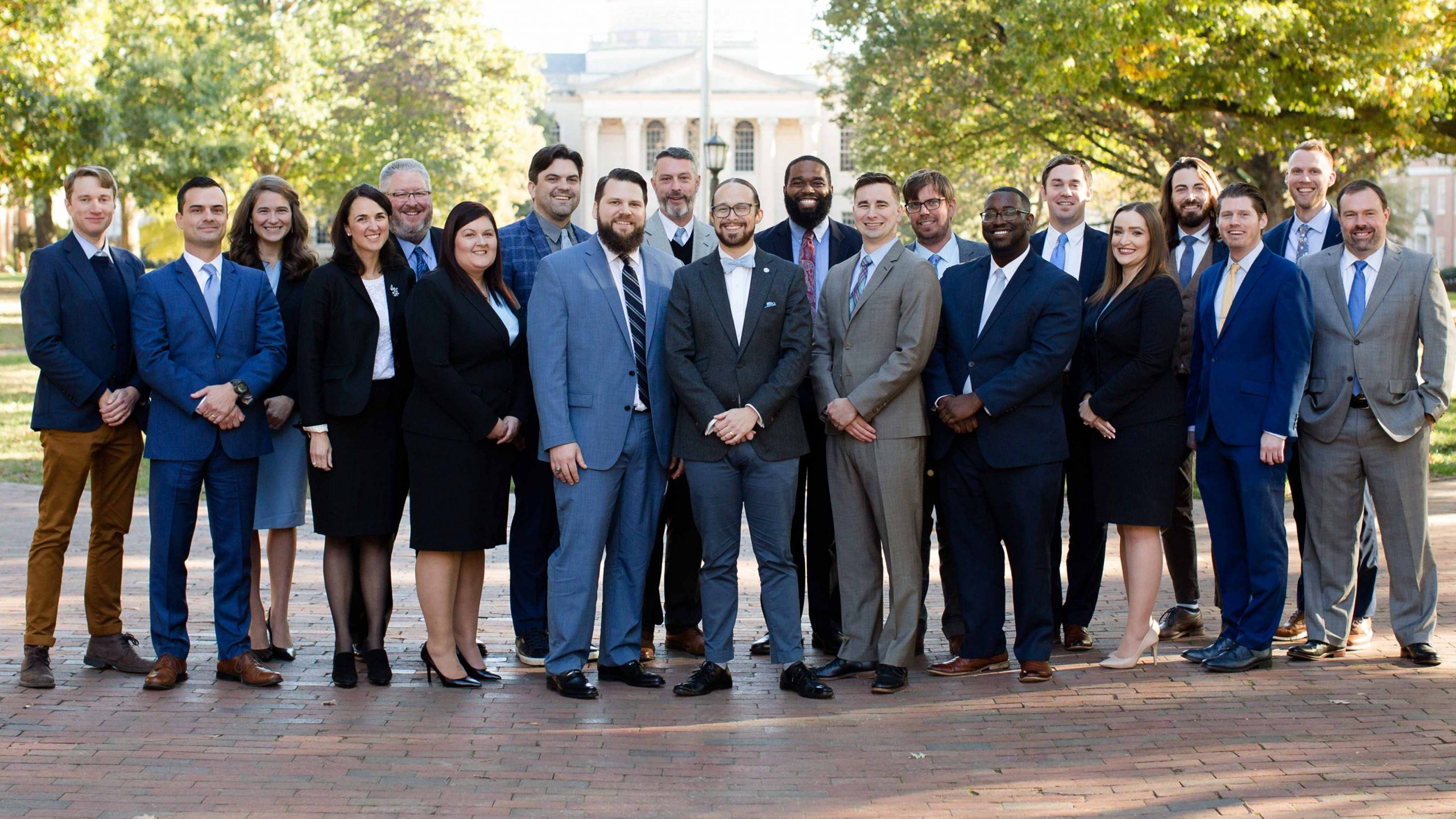By Jess Clarke

A traffic ticket Dan Hatley ’08 received while he was a student at Carolina Law has been his ticket to a fast-growing private practice, built on innovative technology, convenience and stellar service to clients.
With the tagline “Click. Hire. Done.,” iTicket.law, run out of Hatley Law Office in Chapel Hill, has transformed efficiency in legal practice in North Carolina traffic cases since its founding in 2009. And clients are sold on it — iTicket has garnered more than 6,000 reviews and a five-star Google rating. Although iTicket doesn’t promise a certain outcome in cases, the website touts a 100 percent satisfaction guarantee or, potentially, a full refund.
Hatley, iTicket’s founder, owner and managing attorney, felt little satisfaction with the law firm he hired to handle a speeding ticket he received in Harnett County, North Carolina, about 15 years ago.
Once the firm had his information, no one contacted him again. Hatley called the firm a few months later and learned the matter had been taken care of. Although the outcome was good, “I was expecting a higher level of service than hiring someone and never hearing back from them,” he says. “I expected to be in the loop.”
iTicket clients are kept in the loop at every step in the process with emails and text messages. The digital platform contains information in accessible language about traffic citations, from car registration and personal injury issues to license restoration and marijuana laws. The website also offers YouTube videos that explain how the firm handles citations.
And because it’s digital, new clients can sign up 24 hours a day.
At more traditional law practices, clients typically go to an office or talk by phone about their situation, sign papers, and pay up front for a retainer and any court costs and fines, which are usually estimated.
iTicket’s technology meets the needs of its busy, digitally focused clients. “With us, you can get on your phone, type in your name, and basically you’re halfway there…Why would you call people on the phone if you can do this with your browser?” Hatley says. “People who are working two or three jobs don’t have time to go to court or to an attorney’s office and explain why they need an attorney.” In most cases, clients never have to appear in court.
iTicket’s software makes the process easier for its lawyers, too. The proprietary software Hatley created organizes case information, so attorneys can focus on litigating. “We run the company today more like a software company than a law firm,” he notes. “We’re a service company that practices law.”

Madison Scott ’21, a former head legal assistant at iTicket, helped maintain a high level of service for the firm.
She used client-based social skills every day as she talked with people about hiring a lawyer. “Clients were getting very, very personalized assistance,” says Scott, who worked at iTicket as an undergraduate at the University of North Carolina at Chapel Hill and during law school.
In her three years at iTicket, Scott learned about more than legal language, docket details and, by observing Hatley, tips for effective courtroom presentation. She gained insight from the way Hatley and iTicket’s CEO, Tom Kuell, a UNC Kenan-Flagler Business School graduate, work together.
“I saw how, with the right partner and the right idea, incredible things can happen,” Scott says. “It was beautiful to see that and to think that in 10 years I could have an idea, find a business partner and then truly build something…with an entrepreneurial spirit.”
Scott, who has a policy position with Healthy Mothers Healthy Babies Coalition of Georgia, is among many law students and aspiring law students who have worked at iTicket. She learned from Hatley’s mentoring.
“Dan is a very give-it-to-you-straight person. It’s unique to work with someone as kind as he is but also as straightforward as he is…He knew how to walk that line of caring for his staff and pushing us to be the best versions of ourselves,” says Scott, who was Student Bar Association president as a 3L.

She and current iTicket client success manager Josh Jacobs credit Hatley in part with their choice of law school.
Jacobs initially wanted to attend law school outside North Carolina to experience a different place than his home state.
“Dan really showed me how valuable Carolina Law could be, not just as an institution but as a community,” says Jacobs, a 2020 UNC-Chapel Hill graduate who will attend UNC Law this fall. “He explained to me that UNC Law was something that was so rewarding for him…That made me consider sticking around for a little bit longer.”
Jacobs’ conversations with Hatley are wide-ranging, from the financial impacts of law school and iTicket cases to Hatley’s family. “Dan has been very candid about how tough law school can be,” he says. “One of my favorite things about Dan is that his office is always open. That’s something I value about our relationship very much.”
Given that law students and aspiring law students who work at iTicket usually won’t be there for long, Hatley hires most judiciously.
“They have to be the cream of the crop, people we consider stellar,” he says. Despite their short tenure with the firm, “We’re going to invest in them anyway because they’re going to bring that level of talent we really need.”
iTicket has served as another pipeline for law schools. In addition to Jacobs, two other employees will start at Carolina Law this fall, and two more staff members will attend other North Carolina law schools. Two former iTicket employees are also current UNC Law students. “We have a really good relationship with the admissions office at UNC Law,” Hatley says.
But his employees also have gone on to law school at Baylor University, Duke University, New York University and elsewhere. “Our legal assistants are the best of the best, but it helps to have somebody in your corner. I like to be that person for young people,” Hatley says, “helping them to reach their full potential.”
It’s not just law students who gain opportunities through iTicket.
The firm partners with Extraordinary Ventures, a Chapel Hill nonprofit that employs about 10 people to handle over a million mailings annually as part of iTicket’s direct-mail marketing. Before the collaboration, Hatley and his wife, Caroline, stamped and addressed 200 letters a night by hand. Caroline, an educator in the Chapel Hill Carrboro City Schools system and fellow Tar Heel alum, spoke fondly of the memory, “It was rewarding to see our work turn into new clients for the firm, but not sustainable long term as the business, and our family, continued to grow. Extraordinary Ventures helped to fill the gap.”
Hatley’s tie to Extraordinary Ventures dates back to his time in law school. To help pay for his books, he took a job as a support person for a young man who lived with autism whose family was involved with starting the nonprofit.
“It is incredibly meaningful,” Hatley says of the partnership with Extraordinary Ventures, which employs adults with autism and other developmental challenges. He is on the nonprofit’s board of directors and on the human rights committee of the Autism Society of North Carolina.
With an established reputation as a smart, fast option for legal aid, iTicket has launched a license-restoration project to help its clients, some of whom haven’t been able to drive legally in decades. “There is nobody else like us who can clear that up and get that person’s life back,” Hatley says. “We can provide a different level of coordinated service to get a person back in a better position.”
That’s because of iTicket’s rapid growth in North Carolina.
The iTicket operation, which has doubled in size in the past three years, now has a presence in 83 of North Carolina’s 100 counties. Its broad reach enables iTicket to more easily help clients who have traffic citations from multiple counties who otherwise might need to work with law firms in different places. Usually, iTicket attorneys can get licenses eligible for reinstatement.

Given that traffic laws affect everyone, iTicket acts as a type of social justice tool that offers legal representation to some people who might not have access to those services otherwise.
“iTicket has leveled the playing field. It doesn’t matter who you are, you’re going to get quality representation,” Hatley says. At some law firms in the past, “If you sounded the wrong way when you called an attorney on the phone, they would say, ‘Sorry, I can’t help you.’ But a computer doesn’t care.”
Hatley’s intent to give people a fair shot resonated with Jacobs in his iTicket job interview.
“I could tell he wants to help people just as much as I want to help people,” says Jacobs, who plans to pursue immigration law. “He is a guy who gets it.”
Hatley also gets what it takes to keep iTicket growing. With 26 attorneys and 48 administrative staff and managers, the firm is unique in North Carolina in its size and geographic scope, he notes — all because he leveraged technology to meet the needs of consumers.
When he opened his practice, Hatley’s initial work with personal injury law turned into a focus on traffic tickets. As someone who graduated from law school into the uncertainty of the Great Recession in 2008, he had to be nimble in thinking about his career. The idea that became iTicket was in the back of his mind while he was at Carolina Law.
He acknowledges that he struggled with being diligent with his studies in law school, but faculty and staff encouraged him. “And since my graduation, the administration has been a constant cheerleader of my success and has supported me however they could,” Hatley says. He cites Kelly Podger Smith, Carolina Law’s associate dean for external relations and careers, as particularly helpful.
Hatley’s time in law school, especially his business associations class with professor Thomas Hazen, “opened a whole new world to me. It gave me the inspiration to dream about creating a business of my own and the foundation to execute on that dream when I developed the idea that became iTicket.law,” he says.
Once he developed the idea, he sprinted with it. Before Hatley hired Kuell as CEO in 2015, “I was spending every dollar I had creating the program that became iTicket’s proprietary software,” he says. “I’m a hustler. I’m a grinder. I always knew success was within reach if we just kept pushing” he says.
His hustle has always impressed Scott. One of her most valuable takeaways from working at iTicket was realizing the broad range of ways to practice law.
“Going to law school doesn’t necessarily pigeonhole you into one particular way of being a lawyer,” she says. “There was a hole in the field, and with Dan’s and Tom’s skill sets, they were able to fill it. They were working smarter constantly. It was really cool to watch.”
Hatley continues to work smarter. One of his goals with iTicket is an ongoing enhancement of the technology that drives the law practice. “We’re always retooling our proprietary software with new features that increase efficiency and quality of service for clients,” he says.
And he plans to branch out into new locations. He will pilot a foray into Virginia this year and, next year, maybe into other states. The foundation and inspiration Hatley gained in law school provide the framework for iTicket’s expansion.
“From the very beginning of starting the company, I was in a growth mindset. North Carolina is just the first stop. I see iTicket operating in 50 states and beyond,” Hatley says. “Throughout the journey, my degree from Carolina Law has been the passport that opened doors for me.”
With more expansion comes more reward. “When I was in law school, I wanted to create something after I graduated,” he says. “The main thing I love about iTicket is to have created something and nurtured its growth.”
